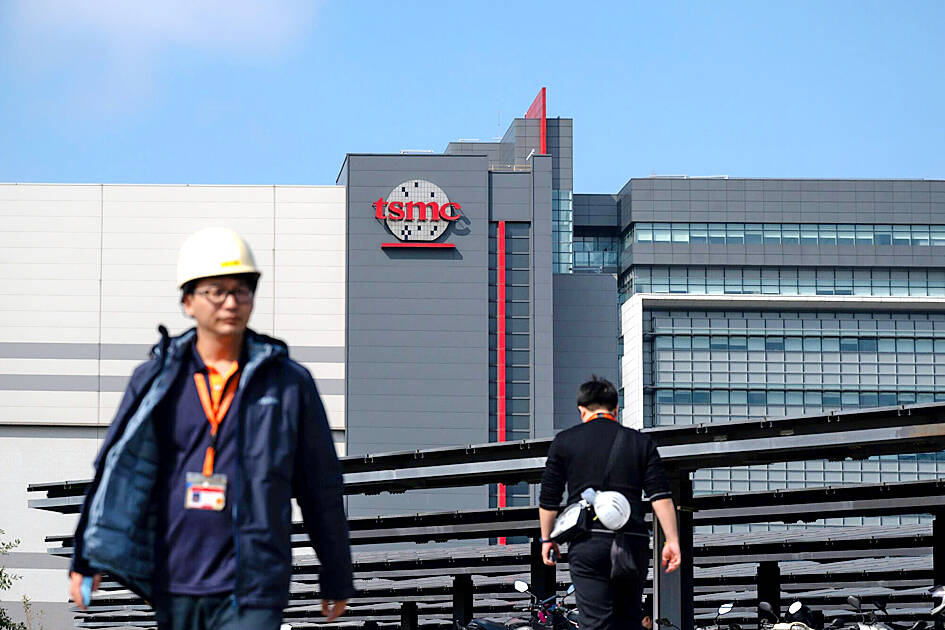Thirty students from the German state of Saxony are to arive in Taiwan in March to receive training in semiconductor manufacturing, visiting Saxony Minister of Science, Culture and Tourism Sebastian Gemkow said in Taipei on Wednesday.
They would be the first group of students to travel to Taiwan under a talent incubation program developed by Taiwan Semiconductor Manufacturing Co (TSMC, 台積電), the Saxony state government and Dresden University of Technology (TU Dresden), Gemkow said in an interview.
The trilateral partnership was established in September last year with the aim of cultivating a skilled workforce in the field of chip manufacturing in the German state, in the wake of TSMC’s announcement it would build a new fab in Dresden, the capital of Saxony.

Photo: Bloomberg
Gemkow said that the students would begin a series of online semiconductor courses next month.
In March, they are to travel to Taiwan, where they would carry on with their courses at local universities, such as National Taiwan University, and undergo training at TSMC’s plants for six months, said Gemkow, who arrived in Taipei on Tuesday for a three-day visit.
In the long run, more German students from TU Dresden and other universities in Saxony who are interested in semiconductors would travel to Taiwan, the official said, adding that the Saxon Science Liaison Office in Taiwan, inaugurated in September last year, has been working around the clock on this endeavor.
TSMC senior vice president of human resources Lora Ho (何麗梅) said the firms hopes that 100 German students specializing in science, technology, engineering or mathematics would be sent to Taiwan as part of the program each year.
In August last year, TSMC announced plans to build a 12-inch wafer fab in Dresden to produce automotive chips as part of a joint venture with Bosch, Infineon Technologies and NXP Semiconductors.
Total investment is expected to exceed 10 billion euros (US$10.9 billion), with the German government promising to provide 5 billion euros in subsidies.

Intel Corp chief executive officer Lip-Bu Tan (陳立武) is expected to meet with Taiwanese suppliers next month in conjunction with the opening of the Computex Taipei trade show, supply chain sources said on Monday. The visit, the first for Tan to Taiwan since assuming his new post last month, would be aimed at enhancing Intel’s ties with suppliers in Taiwan as he attempts to help turn around the struggling US chipmaker, the sources said. Tan is to hold a banquet to celebrate Intel’s 40-year presence in Taiwan before Computex opens on May 20 and invite dozens of Taiwanese suppliers to exchange views

Application-specific integrated circuit designer Faraday Technology Corp (智原) yesterday said that although revenue this quarter would decline 30 percent from last quarter, it retained its full-year forecast of revenue growth of 100 percent. The company attributed the quarterly drop to a slowdown in customers’ production of chips using Faraday’s advanced packaging technology. The company is still confident about its revenue growth this year, given its strong “design-win” — or the projects it won to help customers design their chips, Faraday president Steve Wang (王國雍) told an online earnings conference. “The design-win this year is better than we expected. We believe we will win

Quanta Computer Inc (廣達) chairman Barry Lam (林百里) is expected to share his views about the artificial intelligence (AI) industry’s prospects during his speech at the company’s 37th anniversary ceremony, as AI servers have become a new growth engine for the equipment manufacturing service provider. Lam’s speech is much anticipated, as Quanta has risen as one of the world’s major AI server suppliers. The company reported a 30 percent year-on-year growth in consolidated revenue to NT$1.41 trillion (US$43.35 billion) last year, thanks to fast-growing demand for servers, especially those with AI capabilities. The company told investors in November last year that

Power supply and electronic components maker Delta Electronics Inc (台達電) yesterday said it plans to ship its new 1 megawatt charging systems for electric trucks and buses in the first half of next year at the earliest. The new charging piles, which deliver up to 1 megawatt of charging power, are designed for heavy-duty electric vehicles, and support a maximum current of 1,500 amperes and output of 1,250 volts, Delta said in a news release. “If everything goes smoothly, we could begin shipping those new charging systems as early as in the first half of next year,” a company official said. The new